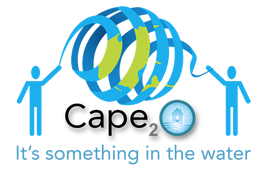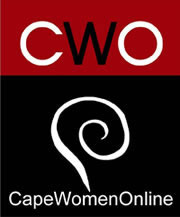CapeWomenOnline - Where Cape Women Shine
Your local venue for the women of Cape Cod to share their ideas, experiences and resources while inspiring each other in their life's journey
Inspire . Encourage . Network . Share

Playing with the Future of the Cape's Water Supply
by Amanda Converse
Cape Cod's water supply is certainly a thing of beauty. Not only does it provide both residents and visitors with a beautiful landscape, but it also supplies everyone with water for their personal and professional needs.
Whether it be for drinking, cooking, cleaning, or even beer making, the groundwater supply here is responsible for sustaining our way of life. The wastewater created by human activity in residential and commercial spaces is generally treated by individual on-site septic systems that drain into the groundwater; the groundwater that flows underground through watersheds to all of the Cape's coastal areas.
Nitrogen is a human waste product that is not removed by septic systems. According to the Cape Cod Commission, "the septic system of an average three-bedroom home loads almost 8.5 pounds of nitrogen into the groundwater each year."
Large amounts of nitrogen in the waterways can lead to excess algae production which in essence suffocates a water body and leads to the loss of other forms of life, such as eel grass and shellfish.
"Most people flush and don't care what happens after that," says Cape Cod Commission Executive Director, Paul Niedzwicki. However, Cape Codders are not going to have any other choice BUT to care, as state and local governments prepare new policy measures and regulations around the issue of wastewater.
According to Neidzwicki, "wastewater is the least sexy public policy issue you are ever going to have to deal with." But deal with it, they must.
The Cape Cod Commission website states that "of the 57 coastal embayments on Cape Cod, 46 of their watersheds have been assessed for the protection and restoration of declining water quality due to eutrophication. The single highest contributor to the eutrophication of coastal embayments on Cape Cod is nitrogen-containing compounds in the water draining from on-site septic systems."
In January the Cape Cod Commission was directed by the Commonwealth of Massachusetts to prepare an update to the 1978 Section 208 Area-Wide Water Quality Management Plan for Cape Cod.
The 208 plan addressed water quality, land use planning, and waste water infrastructure. And according to Cape Cod Commission Special Project's Coordinator, David Still, it predicted many of the wastewater issues Cape Codders face today.
Policy decisions and infrastructure options regarding wastewater management, which range in cost and scale, will be made based on the update of this report.
In an effort to raise public awareness about the issue, the Commission has partnered with Emerson College and their Community Plan-it Tool to produce an interactive educational tool, called Cape-2-O that gathers comments regarding water quality issues from people with a connection to Cape Cod. Still says the feedback they "get back should be able to inform area wide plan." Any stakeholder can participate in the "game" of Cape-2-O. The first game took place throughout August and had three "missions." Each Mission had a theme: exploring the "players'" personal connection to the Cape, their Cape Cod community, and possible scenarios for addressing the wastewater issue.
The players were self-selected from the Commission's social media outreach, as well as direct mail outreach to community environmental groups and word-of-mouth. Once signed up for the game, they were asked to view informational videos and to answer a series of questions, some personal and some fact-based. With every question answered, the player was awarded a certain number of gold coins. At the end of each mission, the gold coins were then "donated" to a local non-profit, such as CapeAbilities, Cape Cod Volunteers, the Boys and Girls Club, Children's Cove, the Cape Cod Children's Museum, and Wild Care. The three non-profits with the most gold coins at the end were awarded a $1,000 grant.
A second game of Cape-2-O will launch in October, and will be more directed on what people would accept as far as infrastructure changes and improvements, as well as what they might be willing to pay for them.
According to Still, some of the goals for the next round of the game are to reduce the amount of time it takes to complete each mission, increase the stakeholder audience, involve the local school systems, and encourage people to engage with other stakeholders in order for the player to earn more gold coins and encourage more conversation and idea exchange.
Presently, Cape-2-O is somewhat of an experiment that allows Cape residents and visitors to make the connection between what they put down the drain and what they see on the shoreline. But by June 2014, the game will have informed the very important public policy discussion.

- clothing
- active wear
- shoes
- accessories
- baby
- body care
- gifts
made from eco-friendly, reclaimed
and recycled materials
535 South Street, Hyannis
508.775.2652

Amanda Converse received her BA in Environmental Studies from Union College, and her Masters in Environmental Policy from The George Washington University. She has held positions as an environmental consultant, and in various environmental nonprofits.
In July 2008 Amanda and her partner Jitka Borowick created Greenover, a green consulting company that helps individuals, businesses and organizations through the process of going "green."
Amanda was also the Development Director for the Hyannis Main Street BID from 2006 to 2010, during which time she worked with many small businesses on their marketing strategies and business models. And in November 2009, Amanda decided to open her own small business, Shift Eco-Boutique, an eco-friendly women's clothing and gift store located in downtown Hyannis.
Amanda has been involved with the Cape & Island's Green program since its inception, and acts as the Program Coordinator, conducting the workshops for participating businesses, as well as providing technical assistance throughout the verification process.


